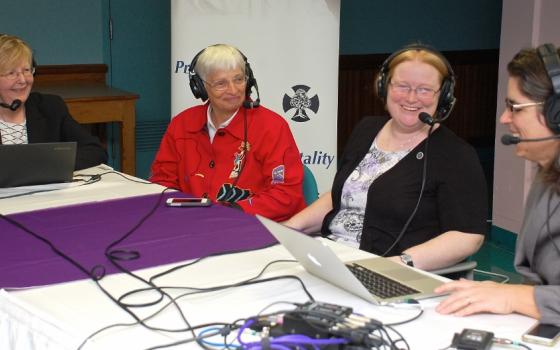Catholic women religious know using the internet to recruit new sisters is effective, and though few have a strategy for exactly how to do that, they're willing to learn, new research shows.
A study released April 18 by A Nun's Life Ministry says most congregations have an online presence — usually a website and a Facebook page — and are eager to further their use of the internet to connect with women discerning a call to religious life.
"There's a lot of enthusiasm among Catholic sisters for using the internet for outreach and a lot of interest in how to use it more effectively," said Immaculate Heart of Mary Sr. Maxine Kollasch, co-founder of A Nun's Life with Immaculate Heart of Mary Sr. Julie Vieira. "It gives us a good picture of how sisters want to reach out and meet people."
A separate study shows that the internet is now one of the most common ways women become acquainted with the congregation they enter, making sisters' online presence critical.
But the study — commissioned by A Nun's Life, performed by the Center for Applied Research in the Apostolate at Georgetown University and funded by a grant from the Conrad N. Hilton Foundation, which also funds Global Sisters Report — showed that 76 percent of congregations that responded to the survey did not have a written plan of desired outcomes or strategies for promoting vocations online. The study also showed that 51 percent did not use web analytics to see how the content they put online is used.
"Having those kinds of strategies and having the capacity to use analytics are two key opportunities that came out of the research," Kollasch told GSR.
Read the executive summaries of the study here: Phase 1 and Phase 2
The study, conducted from January to June 2016, sent surveys to 561 congregations of women religious in the United States, of which 257 responded. A second phase of the study surveyed 6,833 individual sisters.
"Reaching women interested in religious life online is a real necessity for institutes looking to grow," CARA's Mark Gray, the study's principal author, said in a statement from A Nun's Life announcing the results. "This is where the next generation of women religious is already searching."
Vieira said the study was aimed at helping congregations do what A Nun's Life, based in Toledo, Ohio, has done since it was founded in 2006 to create an online culture of vocation.
"A Nun's Life was interested in a research study about institutes' online presence to gain insights into what might be helpful across the board for vocation outreach using the Internet," she said in the statement. The ministry also works with congregations on using their online presence for relationship-building; this data will help them focus those efforts, she said.
Kollasch told GSR an online presence is especially important now that young people are less likely to encounter sisters in schools or parishes.
"Now, sisters can use social media to make those connections, to encounter young people and especially young women," she said.
Melissa Cessac, who is in formation with the Congregation of Divine Providence in Texas, said she turned to the internet when she began discerning a call to religious life because there were few nuns in her home diocese.
"I was interested in communities that showed aspects of sisters in ministry and sisters who blogged about their own experiences," Cessac said in the A Nun's Life statement. "Social media is the way of today. An online presence is essential because that's where everyone goes to gather information."
But the study also showed that sisters' use of social media doesn't always match up with the way young people use it: While platforms such as Pinterest, Instagram and Snapchat are popular with young women, most congregations' social media presence is limited to Facebook. Fourteen percent of responding congregations use Pinterest, and 11 percent use Instagram. Only 4 percent use Snapchat.
Congregations that use the internet extensively say it gives discerning women a level of comfort they can't get in other ways because it allows them to choose the level of interaction.
"Social media allows the discerner to interact with us at a pace and distance that they find comfortable," Dominican Sr. June Fitzgerald, vocation minister for the Dominican Sisters of Peace in New Haven, Connecticut, said in the statement. "They can post, respond, send a message — or simply read, observe and learn. Being a part of a media that they use every day helps reinforce the message that they may be receiving in their heart and creates a non-threatening way to learn more and ask questions."
Kollasch said the next step for A Nun's Life now that it has the data is to find ways to meet the needs it revealed.
"The new research study highlights both the need for and desire of religious institutes to receive increased training and resources to enhance vocation outreach, especially on the most promising platforms," Kollasch said in the A Nun's Life statement. "Our plan is to collaborate with others to create resources that will benefit Catholic sisters in reaching out to help people find their path in life and respond to God's calling."
[Dan Stockman is national correspondent for Global Sisters Report. His email address is [email protected]. Follow him on Twitter or on Facebook.]
Related - Social media opens windows to women religious communities and their charisms and
Finding religious life through social media: A Nun's Life Ministry


